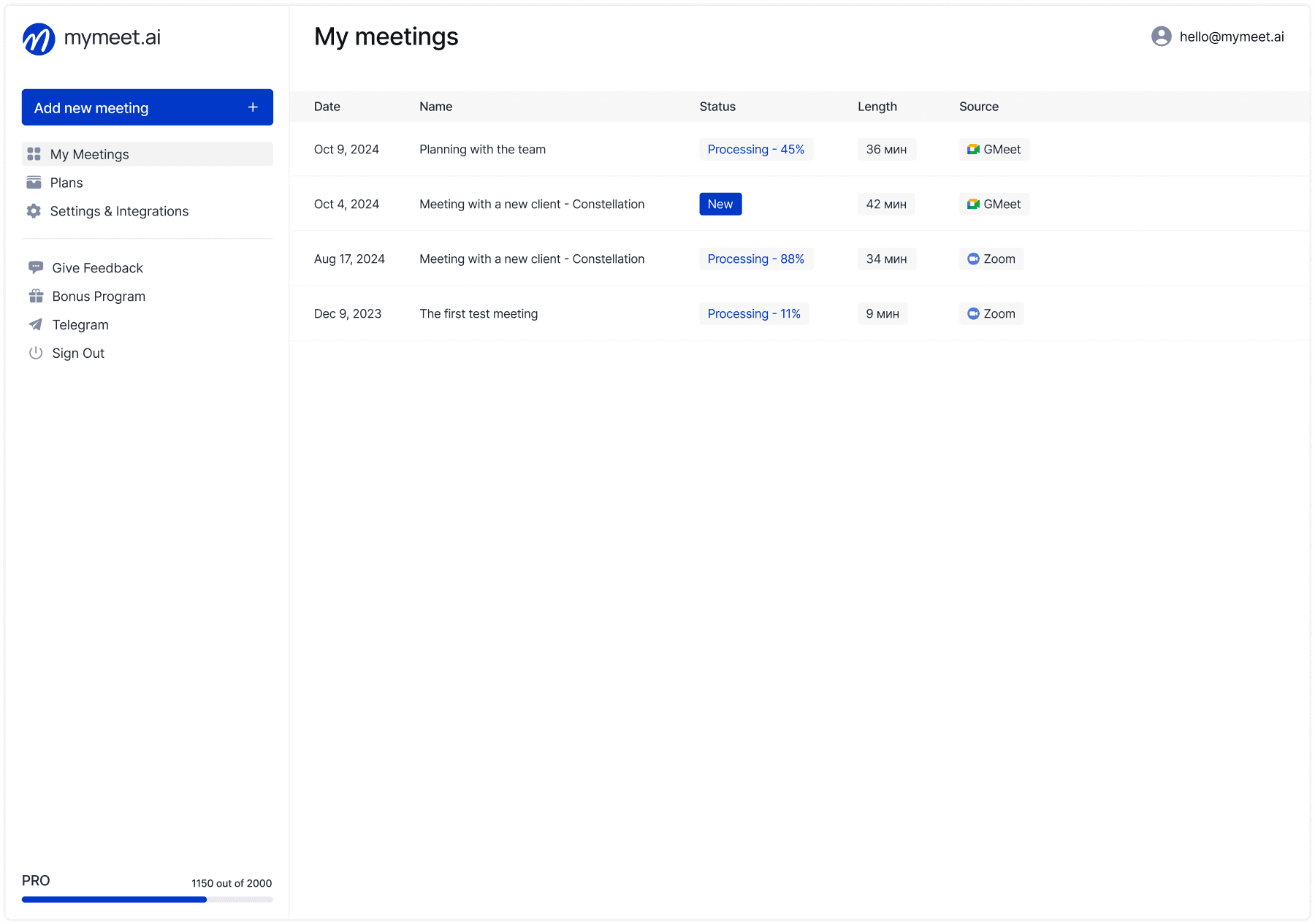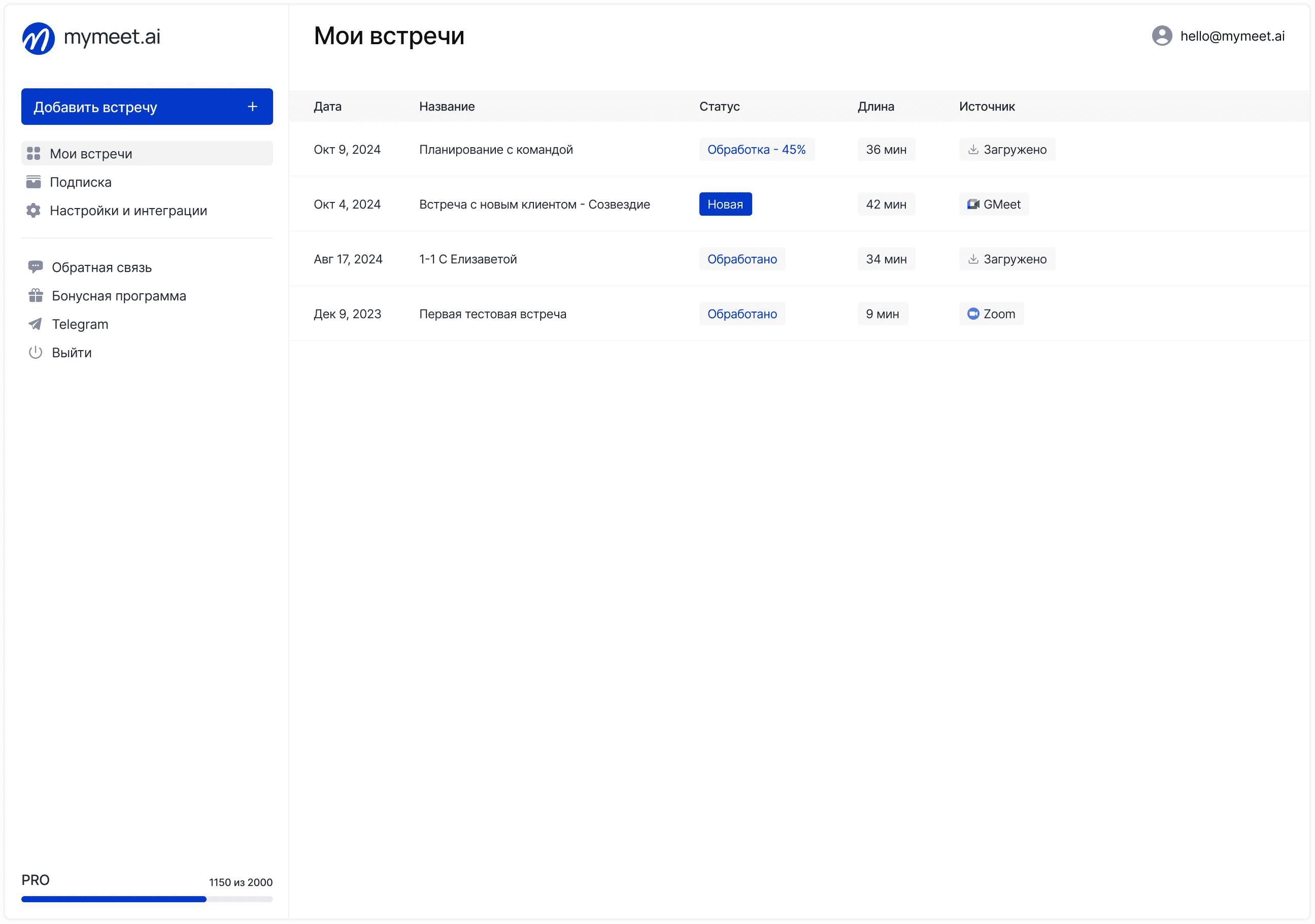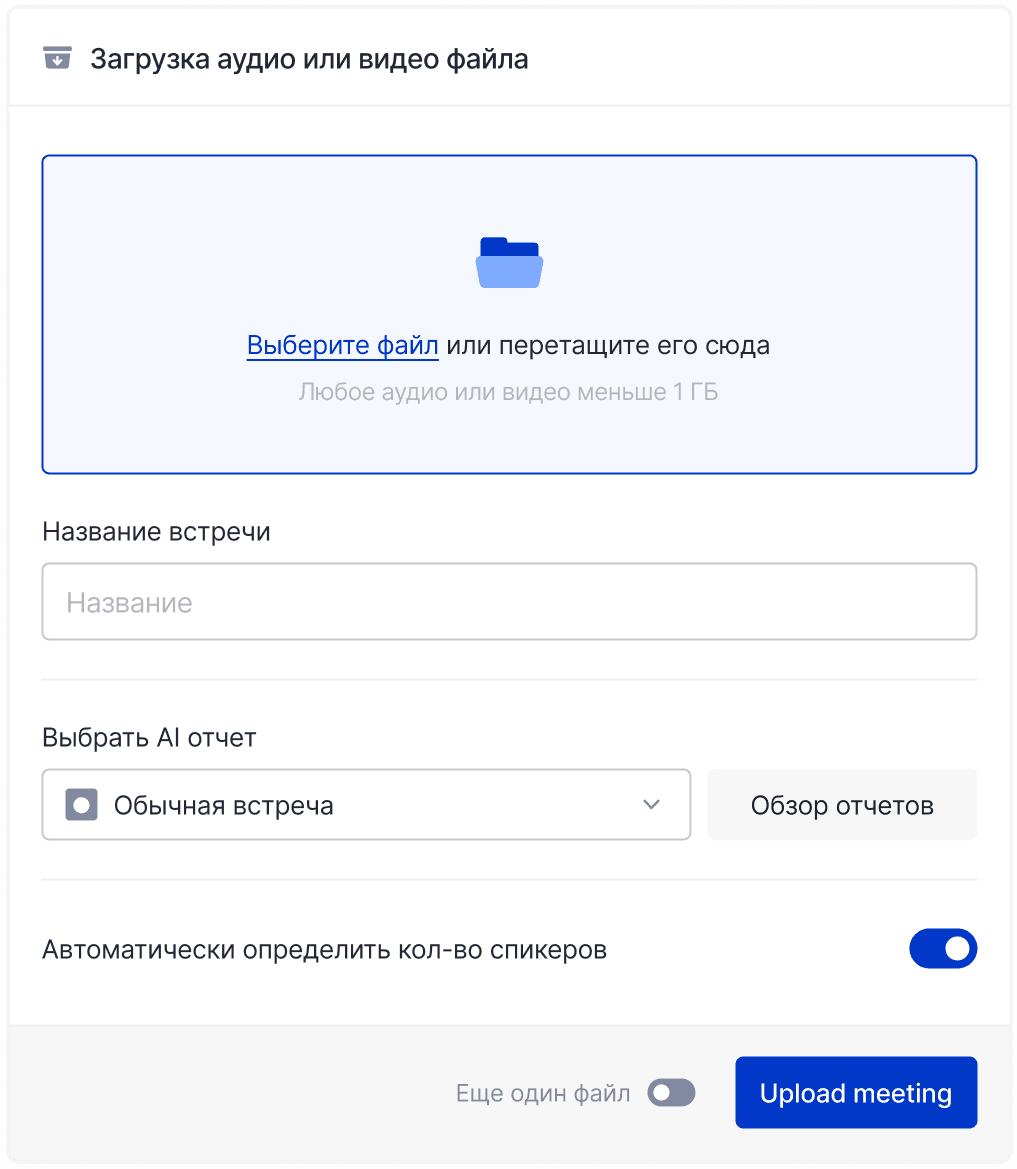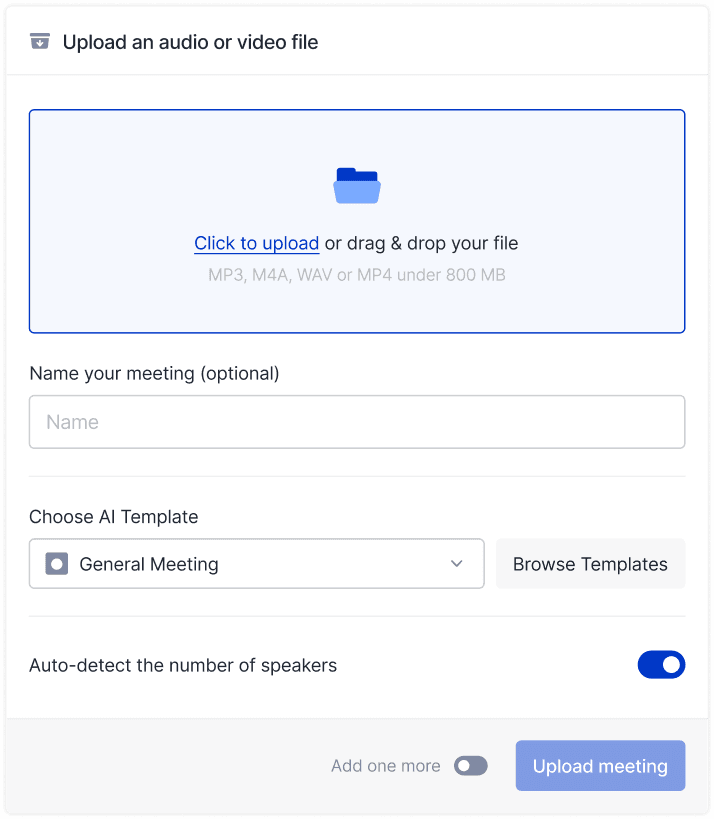Meeting Tips

Andrey Shcherbina
Nov 16, 2025
Manager plans team meeting and writes in calendar "General Meeting." Twelve people arrive, each expecting something different—one thought they'd discuss quarterly strategy, another prepared progress report, third wanted to solve technical problem. Two hours of chaotic discussion where everyone talks about different things, no concrete results. Problem is wrong meeting type for the task.
Hi there! The mymeet.ai team analyzes thousands of meetings monthly and knows that proper meeting format is critical for results. Status meeting requires one approach, brainstorming—completely different one. Calling wrong meeting type guarantees wasted time. We'll cover main business meeting types, when to use each, and how to conduct effectively.
Why Distinguish Meeting Types
"A meeting is a meeting"—common misconception that kills productivity.
Different Goals Require Different Formats
Goal determines format. Meeting to inform employees about new company policy radically differs from meeting to generate creative ideas or make complex decision.
If you gather people to "just discuss project" without clear format—discussion goes in all directions. Some try to report progress, others generate ideas, third solve current problems. Result—chaos.
Proper Format Saves Time
Wrong meeting type stretches time 2-3 times. Attempting to make decision at "brainstorming" format meeting leads to endless discussions without specifics. Attempting to generate ideas at formal meeting with management kills creativity.
Clear meeting type definition allows proper preparation, inviting right people, using appropriate moderation tools.
Participant Expectations
Participants must know what meeting awaits them to prepare correctly.
If meeting invitation says "Project Status"—people prepare progress reports. If "Solving Problem X"—they study problem context and think about solutions. If "Product Idea Generation"—they tune into creativity.
Vague meeting name creates uncertainty and improper preparation.
Meeting Type Classification
Business meetings can be classified by several criteria.
By Goals
Informational—deliver information to audience (presentations, announcements, training)
Discussion—discuss question collectively (statuses, planning, reviews)
Decision-making—make specific decision (option selection, plan approval)
Generative—create something new (ideas, concepts, strategies)
Problem-solving—find solution to specific problem
Team-building—improve interaction and atmosphere in team
By Regularity
One-time—conducted once for specific purpose
Regular—repeated with certain periodicity (daily, weekly, monthly)
Periodic—conducted as needed without strict schedule
By Audience Size
One-on-one—meeting of two people (1-on-1 with manager, mentor meeting)
Small group—3-8 people (team work meetings)
Medium group—10-20 people (department meetings)
Large audience—20+ people (general gatherings, webinars)
By Format
In-person—all participants in one place physically
Online—video conference with remote participants
Hybrid—some participants in-person, some online
Meeting Types by Goals: Detailed Breakdown
Let's examine main meeting types used in business.
1. Status Meetings
Status meetings—regular gatherings to synchronize team on current work progress, problems, and plans.
Purpose and Features
Main goal—keep everyone informed about what's happening with project or in team. Not to solve problems deeply, not to generate ideas, not to make strategic decisions—just synchronize on current status.
Key features:
Regularity—conducted on schedule (daily, weekly)
Brevity—usually 15-30 minutes
Structure—clear discussion format
Fact focus—what's done, what's planned, what blockers
Status Meeting Formats
Daily Standup—15 minutes each morning, each participant briefly answers three questions:
What did yesterday
What will do today
What blockers exist
Weekly Project Status—30-60 minutes weekly, more detailed overview:
Progress on key tasks
Metrics and KPIs
Risks and problems
Plans for next week
Monthly Review—monthly results discussion and plans for next month
Who Participates
Mandatory: entire team working on project or in division
Optional: manager, stakeholders (at weekly and monthly)
Not needed: people not connected to current work
How to Conduct Effectively
Strict timebox—if standup should be 15 minutes, it must be exactly 15 minutes. Use timer.
Standing or with cameras—standups conducted standing so they don't drag. Online—cameras must be on.
No problem-solving—if complex problem arose, capture it and discuss separately after standup with needed people.
Focus on blockers—main thing is identify what hinders work and quickly resolve it.
Typical Mistakes
Turning into manager report—participants tell for boss, not for team
Solving technical problems—two people start solving task, others wait
Dragging—15-minute meeting lasts 40
No preparation—people arrive and think what to say on the fly
2. Decision-Making Meetings
Decision-making meetings—gatherings where team or group of people must arrive at specific decision on important question.
Purpose and Features
Main goal—make specific decision and capture it. Not just discuss, but actually choose action option from several alternatives.
Key features:
Clear question requiring decision
Pre-prepared options
Criteria for evaluating options
Participants' authority to make decision
Documented decision at end
Decision Types
Strategic—choosing product development direction, entering new market, restructuring
Tactical—choosing contractor, approving budget, allocating resources
Operational—resolving current work questions requiring coordination
Meeting Structure
1. Question formulation (5 minutes)—clear definition of what we're deciding
2. Option presentation (20 minutes)—each option with pros, cons, risks
3. Discussion (30 minutes)—questions, arguments, additional information
4. Decision-making (10 minutes)—option selection and capture
5. Next steps (5 minutes)—who does what to implement decision
Who Participates
Mandatory:
Decision-makers (management, process owners)
Topic experts
People who will implement decision
Not needed: observers, people without expertise and authority
Decision-Making Methods
Consensus—everyone agrees with decision. Long but creates greatest support.
Majority vote—voting, option with most votes wins.
Consultative decision—manager listens to opinions and makes decision themselves.
Decision matrix—evaluating options by weighted criteria, choosing highest score.
How to Conduct Effectively
Prepare options in advance—participants must study them before meeting
Use data—decisions based on facts, not opinions
Limit number of options—2-4 options optimal, more—hard to choose
Capture decision in writing—immediately after making
Assign responsible party—who will implement decision
Typical Mistakes
No prepared options—waste time generating options instead of choosing
Endless discussion—discuss for hours, decision not made
Unclear who decides—everyone spoke, but who makes final decision
Decision not documented—week later arguing about what was decided
3. Problem-Solving Meetings
Problem-solving meetings—gatherings to analyze specific problem and find paths to solution.
Purpose and Features
Main goal—understand problem, find root cause, and develop solution plan.
Difference from decision-making meeting: focus on problem analysis and solution option generation, not on choosing from ready options.
Key features:
Specific problem to solve
Analytical approach
Collective solution search
Action plan at end
Meeting Structure
1. Problem description (10 minutes)—what happened, how manifests, what damage
2. Cause analysis (20 minutes)—why happened, what led to problem
3. Solution option generation (20 minutes)—how can solve, multiple ideas
4. Option evaluation (15 minutes)—which options realistic and effective
5. Action plan (15 minutes)—what specifically doing, who, when
Problem Analysis Methods
5 Whys—sequentially ask "why did this happen" five times to reach root cause
Ishikawa Diagram (fishbone)—visualization of all possible problem causes by categories
SWOT Analysis—analyzing strengths, weaknesses, opportunities, and threats related to problem
Data analysis—studying metrics, logs, reports to understand problem
Who Participates
Mandatory:
People who encountered problem
Experts in relevant area
Those who will implement solution
Useful: outside person for fresh perspective
How to Conduct Effectively
Start with facts—gather all problem data before meeting
Use visualization—draw diagrams, graphs, timelines
Separate symptoms from causes—don't confuse problem manifestations with sources
Generate many options—don't stop at first solution
Be specific in plan—not "improve process," but "implement automatic check by Friday"
Typical Mistakes
Jump to solution—without understanding causes
Blaming people—looking for guilty instead of causes in processes
Superficial analysis—stop at obvious causes, don't dig deeper
Unrealistic solutions—propose something impossible
4. Creative Meetings and Brainstorming
Creative meetings—gatherings to generate new ideas, concepts, solutions in free creative atmosphere.
Purpose and Features
Main goal—generate maximum number of ideas without evaluation and criticism. Quantity more important than quality at generation stage.
Key features:
Free atmosphere without criticism
Encouraging unusual ideas
Idea quantity more important than quality
Combining and developing others' ideas
Delayed idea evaluation
Creative Meeting Formats
Classic brainstorming—participants call out ideas, moderator captures all without evaluation
Brainwriting—participants write ideas on paper silently, then exchange and develop others' ideas
Reverse brainstorming—generate ideas how to make worse, then invert to positive
SCAMPER—idea generation through questions: what can substitute, combine, adapt, modify, apply differently, eliminate, reverse
Mind mapping—visual idea map with branches
Brainstorming Rules
Don't criticize—no idea evaluation during generation
Encourage crazy ideas—the more unusual, the better
Quantity—goal is generate maximum ideas
Combine—develop and improve others' ideas
Visualize—draw, use stickers, boards
Creative Meeting Structure
1. Challenge formulation (5 minutes)—clearly define what we're inventing
2. Warm-up (5-10 minutes)—light exercise to tune into creativity
3. Idea generation (30-40 minutes)—main brainstorm phase
4. Clustering (10 minutes)—grouping similar ideas
5. Voting (10 minutes)—choosing most promising ideas for development
Who Participates
Optimal: 6-12 people of different backgrounds
Useful: people outside team for fresh perspective
Important: participants open to creativity, not skeptics
How to Conduct Effectively
Create safe atmosphere—emphasize no bad ideas exist
Limit time—short intense sessions more effective than long
Use visual tools—boards, stickers, markers
Mix methods—combine different generation techniques
Don't evaluate immediately—postpone critical analysis for later
After Meeting
Idea evaluation—separate meeting to analyze promising ideas
Prototyping—quick verification of best concepts
Implementation plan—turning ideas into specific projects
Typical Mistakes
Criticism during generation—kills creativity
One person dominating—others stay silent
Too serious atmosphere—constrains creativity
No follow-up actions—ideas forgotten
5. Information Sharing Meetings and Presentations
Information meetings—gatherings to deliver information to audience in one-way format.
Purpose and Features
Main goal—inform participants about something important. This is not discussion, but information transmission.
Key features:
One-way communication (mostly)
Presenter prepares content in advance
Questions at end or along way
Often large audience
Information Meeting Types
Company All-Hands—management shares news, results, plans with entire company
Quarterly/Annual Reports—financial results and achievements presentation
Product Presentations—new features or products demonstration
Training Sessions—trainings, workshops, knowledge transfer
Change Announcements—informing about new policies, processes, reorganization
Information Meeting Structure
1. Introduction (5 minutes)—context, why important, what you'll learn
2. Main content (30-40 minutes)—information presentation
3. Q&A (15-20 minutes)—clarifying unclear points
4. Next steps (5 minutes)—what to do with received information
Who Participates
Presenter: expert or manager owning information
Audience: everyone for whom information relevant
Size: from 10 to hundreds of participants
How to Conduct Effectively
Prepare quality presentation—visual, structured, not text-overloaded
Tell story—not just facts, but narrative with beginning, middle, end
Use examples—specific cases clearer than abstract concepts
Leave time for questions—minimum 20% of meeting time
Record and distribute—for those who couldn't attend
Provide materials—slides, documents, links after meeting
Typical Mistakes
Information overload—too much at once
Monotone delivery—sleep-inducing monologue without energy
No interactivity—full hour of one-way story
Complex terminology—audience doesn't understand
6. One-on-One Meetings
One-on-one meetings—regular personal conversations between manager and employee or between colleagues.
Purpose and Features
Main goal—build trusting relationships, discuss development, give and receive feedback in private setting.
Key features:
Only two people
Regularity (usually weekly or biweekly)
Focus on person, not just tasks
Confidentiality
Two-way communication
One-on-One Types
Manager - Employee—discussing work, career, problems, feedback
Mentorship—experienced specialist helps less experienced develop
Coaching—developing specific skills or achieving goals
Peer One-on-One—regular colleague meetings for mutual support
1-on-1 Meeting Structure
1. Check-in (5 minutes)—how things generally, how's mood
2. Current work discussion (10 minutes)—progress, problems, help needed
3. Development and career (10 minutes)—long-term goals, learning, growth
4. Feedback (10 minutes)—in both directions
5. Next steps (5 minutes)—agreements, action items
Duration: 30-60 minutes
Frequency: weekly or biweekly
Discussion Topics
Work:
Project progress
Obstacles and how to help
Priorities and focus
Team collaboration
Development:
Career goals
Skills to develop
Training courses
New opportunities
Personal:
Work-life balance
Motivation and engagement
Problems and stress
What like/dislike about work
How to Conduct Effectively
Regularity is sacred—don't cancel without good reason
Employee sets agenda—let them decide what to discuss
Listen more than talk—70/30 ratio
Take notes—capture agreements
Follow action items—check completion from last meeting
Privacy—closed room, confidentiality
Typical Mistakes
Turning into status—only discussing tasks, ignoring development
Manager monologue—employee only listens
Cancellations and postponements—irregularity kills trust
No preparation—arrive without thinking what to discuss
7. Team Building Meetings
Team building meetings—events to strengthen team relationships, increase trust, and improve interaction.
Purpose and Features
Main goal—improve team dynamics, create trust, increase engagement through informal communication and joint activities.
Key features:
Informal atmosphere
Focus on interaction, not work
Activities and games
Equal participation from everyone
Creating positive emotions
Team Building Types
Social Events—joint lunches, movies, sports events
Game Activities—quests, board games, team competitions
Learning Team Building—workshops, trainings with collaboration elements
Volunteering—joint charity projects
Retreats—offsite events for 1-3 days
Activity Formats
Icebreakers—short games for getting acquainted (especially for new teams)
Trust Games—exercises requiring mutual help
Creative Workshops—jointly creating something
Quests and Escape Rooms—team problem solving
Sports Activities—bowling, paintball, rope park
How to Organize Effectively
Consider team interests—not everyone likes active sports or intellectual games
Make inclusive—activities should be accessible to all
Don't force—participation should be voluntary
Balance fun and benefit—not just entertainment, but strengthening bonds
Regularity—quarterly minimum
Online Team Building
Virtual Games—online quizzes, video call games
Virtual Coffee Break—informal video chat communication
Talent Show—participants share hobbies
Online Workshops—joint learning something new
Typical Mistakes
Forced fun—forcing activities
Ignoring introverts—activities only for extroverts
Irregularity—once a year doesn't work
No goal—just hanging out without team strengthening
Hybrid Meeting Formats
Real meetings often combine several types.
Combined Meetings
Status + Problem-Solving—start with progress overview, then deepen into specific problem
Information + Q&A—information presentation with subsequent discussion
Creative + Decision—idea generation with immediate selection of best
When to Combine
Combine types when:
Topics closely related
Same participants
Time limited
Don't combine when:
Types require different approaches
Need different participants
Each topic requires full attention
How to Choose Right Meeting Type
Ask yourself questions before creating meeting:
1. What's the goal?
Inform → Information meeting
Synchronize → Status meeting
Solve problem → Problem-solving
Make decision → Decision meeting
Invent new → Creative meeting
Improve relationships → Team building
2. Does this need meeting?
Can email work?
Can async discussion work?
3. Who should be there?
Who makes decisions?
Whose expertise needed?
Who will implement?
4. How much time needed?
Status—15-30 minutes
Decisions—60 minutes
Creative—90 minutes
Information—45-60 minutes
5. How often?
Regular or one-time?
What frequency optimal?
Automating Meeting Work
Right meeting type—first step. Second—effective result documentation.
Mymeet.ai automates work with all meeting types:
✅ Meeting type recognition—AI determines format and creates corresponding report
✅ Specialized templates—for statuses, decisions, brainstorms, 1-on-1s
✅ Key information extraction—decisions from decision meetings, ideas from creative, action items from problem-solving
✅ Automatic recording of all meeting types with transcription
✅ Knowledge base—search through all past meetings of any type
Case Study: How ProductTeam Optimized Meeting Types
ProductTeam development team of 15 people conducted 30+ meetings weekly. All meetings called "Project Discussion" without clear format.
Problem: Unclear format led to chaotic discussions. Status meetings turned into brainstorms, creative sessions into decision attempts. Participants didn't understand how to prepare. Meetings lasted 2x longer than needed.
Solution: Implemented clear meeting classification:
Daily standup 15 minutes—status
Weekly review 45 minutes—status + problems
Creative sessions 90 minutes—idea generation only
Decision meetings 60 minutes—decision-making only
Monthly 1-on-1 30 minutes—development and feedback
Mymeet.ai recorded all meetings and created reports by meeting type.
Results:
35% meeting time reduction
Increased result specificity
Proper participant preparation
Clear documentation of each type
Conclusion
Right meeting type critical for effectiveness. Status meetings keep team synchronized, decision-making helps choose path, problem-solving finds way out of difficulties, creative generates new, informational delivers important, one-on-one builds relationships, team building strengthens bonds.
Don't call "just a meeting"—define type, prepare accordingly, invite right people, use proper moderation format. Document results through automation.
Try mymeet.ai for free—180 minutes of automatic recording of any meeting type without card attachment.
Frequently Asked Questions About Meeting Types
How to determine which meeting type is needed?
Ask yourself what's main goal: inform → informational, synchronize → status, solve problem → problem-solving, make decision → decision-making, invent new → creative. Goal determines type.
Can you combine different types in one meeting?
Yes but carefully. Combine close types (status + problems). Don't combine opposites (creative + strict decisions). If combining—clearly divide by time and explicitly switch formats.
How long should each meeting type last?
Status—15-30 minutes, decision—45-60 minutes, problem-solving—60-90 minutes, creative—60-90 minutes, informational—45-60 minutes, 1-on-1—30-60 minutes, team building—2-4 hours. Vary by topic complexity.
What group size is optimal for each type?
Status—whole team (5-15), decision—5-8 key people, problem-solving—5-10 experts, creative—6-12 diverse people, informational—any size, 1-on-1—two people. More people—harder moderation.
How often to conduct each meeting type?
Status—daily or weekly, decision—as needed, problem-solving—when problem arises, creative—monthly/quarterly, informational—per events, 1-on-1—weekly/biweekly, team building—quarterly.
What if meeting type chosen incorrectly?
Stop meeting and reformat if realized at start. If already mid-way—finish, but capture need for different type meeting. Always better to admit mistake than continue ineffectively.
Are different participants needed for different meeting types?
Yes, critical. Creative session requires open people, decision—those with authority, status—whole team, 1-on-1—two specific people. Wrong participants kill effectiveness of any meeting type.
How to moderate different meeting types?
Each type requires own approach. Status—strict timebox, creative—encouraging ideas without criticism, decision—focus on choosing option, problem-solving—structured analysis. Moderator must understand type specifics.
Can all meetings be conducted online?
Yes, all types work online with proper organization. Creative requires virtual boards, team building—special online activities, others adapt easily. Main thing—right tools and moderation.
How to automate documenting different meeting types?
Mymeet.ai recognizes meeting type and creates corresponding report. For status—progress and blockers, for decision—decisions made, for creative—idea list, for problem-solving—analysis and action plan. Automatic adaptation to format saves time on manual structuring.
Andrey Shcherbina
Nov 16, 2025








